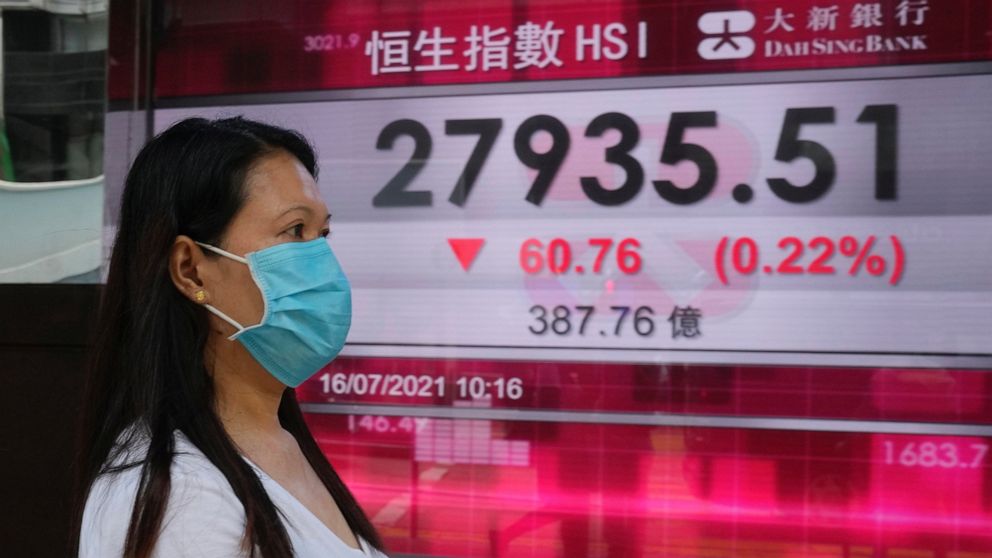Asian stocks mixed, Europe gains after Wall St decline
Shares have opened higher in Europe after a mixed day of trading in Asia, where rising coronavirus cases and the risks to pandemic recoveries weighed on sentiment
BANGKOK — Shares opened higher in Europe on Friday after a mixed day of trading in Asia, where rising coronavirus cases and the risks to pandemic recoveries weighed on sentiment.
Stocks rose in Paris, Frankfurt and Hong Kong but fell in Tokyo, Seoul and Shanghai. U.S. futures edged higher, while oil prices declined.
The Bank of Japan kept its policy settings intact Friday but downgraded its growth forecast for the current fiscal year slightly, to 3.5%-4% from 3.5%-4.4%. It said the outlook for the world’s No. 3 economy was “highly unclear” and depends on how the COVID-19 situation unfolds.
Tokyo reported a 6-month high number of new cases on Thursday, 1,308, just over a week before the Olympic Games are due to begin a year later than originally planned due to the pandemic. With most of its population not fully vaccinated, many in Japan worry the Olympics will raise the risks of further outbreaks at a time when the delta variant of COVID-19 is causing flare-ups worldwide.
In European trading, Germany’s DAX added 0.2% to 15,662.78 and the CAC 40 in Paris gained 0.3% to 6,515.42. Britain’s FTSE 100 surged 0.6% to 7,050.95.
The future for the Dow Jones Industrial Average edged 0.1% higher while that for the S&P 500 was nearly unchanged.
Tokyo’s Nikkei 225 index lost 1% to 28,003.08 while the Kospi in Seoul declined 0.3% to 3,276.91. The Shanghai Composite index slipped 0.7% to 3,539.30. Hong Kong’s Hang Seng rose 0.3% to 28,072.66. In Australia, the S&P/ASX 200 edged up 0.2% to 7,348.10.
Adding to uncertainty, President Joe Biden told reporters Thursday his administration was preparing to issue a blanket warning to U.S. firms about the risks of doing business in Hong Kong as China clamps down on political and economic freedoms in the territory.
U.S. officials say the advisory could be issued as soon as this week.
On Thursday, major U.S. stock indexes closed mostly, pulling back further from the record highs they reached at the start of the week.
The S&P 500 fell 0.3% to 4,360.03 and is track for its first weekly loss in four weeks.
The tech-heavy Nasdaq slid 0.7% to 14,543.13. The Dow Jones Industrial Average gained 0.2% to 34,987.02. The Russell 2000 index of small cap stocks lost 0.6% to 2,190.29.
Investors are watching where the economy is headed as the pandemic wanes and on what companies have to say about how higher inflation is affecting their businesses.
On Thursday, Federal Reserve Chair Jerome Powell delivered his second day of testimony before Congress. He reiterated that signs of inflation should ease or reverse over time, as the U.S. emerges from an unparalleled economic reopening following the pandemic-induced recession.
New data on applications for unemployment benefits signaled the labor market continues to improve. The Labor Department said Thursday that unemployment claims fell by 26,000 last week to 360,000, the lowest level since the pandemic struck last year.
Many companies will begin reporting next week when earnings season gets into full swing.
The yield on the 10-year Treasury note rose to 1.33% from 1.30% late Thursday.
In other trading Friday, U.S. benchmark crude oil lost 6 cents to $71.59 per barrel in electronic trading on the New York Mercantile Exchange. It gave up $1.48 to $71.65 per barrel on Thursday. Brent crude, the international pricing standard, shed 8 cents to $73.39 per barrel.
The U.S. dollar rose to 110.19 Japanese yen from 109.85 yen. The euro slipped to $1.1801 from $1.1813.
![]()


